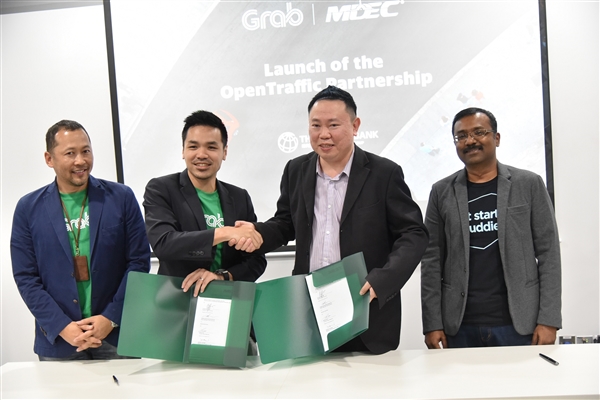Grab, a ride hailing technology company, and Malaysia Digital Economy Corporation Sdn. Bhd. (MDEC) together with the World Bank Group launched the OpenTraffic initiative in Malaysia, which provides traffic data from Grab’s GPS data streams to address traffic congestion and improve road safety in major Malaysian cities.

OpenTraffic provides Malaysia’s traffic management agencies and city planners with access to an open dataset to better manage traffic flow and make investment decisions on local transport infrastructure.
Provided at no cost to governments via an open data license, OpenTraffic translates Grab drivers’ GPS data into anonymised traffic data, to map traffic speeds on roads for analysing traffic congestion peak patterns and travel times. The platform is designed to assist traffic management agencies with easing traffic flows, particularly within dense urban areas. Local government agencies can use the data to enhance existing traffic management systems such as optimising traffic light control and coordination. Easing city congestion during peak hour traffic helps reduce carbon emission and saves commuters time from less traffic congestion.
“At Grab, we maintain one of the largest datasets in the region derived from our drivers’ GPS data across Southeast Asia. As the region’s leading ride hailing platform, we want to contribute by sharing our data and working alongside local government agencies to make transport more accessible for the 620 million people in the region. We are certainly excited to participate in the OpenTraffic project to help shape and improve Malaysia’s transport sector,” said Sean Goh, Country Head of Grab Malaysia.
Grab and the World Bank Group, with the assistance of MDEC, introduced an early preview of the OpenTraffic dataset and web-based querying platform to 30 representatives from various local enforcement, town planning and council agencies.
Malaysia is the second country to gain access to the OpenTraffic platform, with the Philippines the first when it was launched in April 2016. OpenTraffic has enabled the Philippines to make a number of enhancements such as an improvement in traffic signal times along the primary west-east arterial in Cebu City without the need for additional infrastructure investment, lower transport cost for commuters and improve the quality of travel time survey work along Manila’s EDSA, the most congested corridor in the country, as well as evaluate optimal commuting times for select barangays in Metro Manila.
As part of its ongoing partnership with the World Bank Group, Grab has also been invited to participate in the Open Transport Partnership (OTP), a global initiative incubated by the World Bank, which is building the foundation for the next generation of public-private data partnerships, facilitating responsible use of private sector big data for the public good. OTP supports mutually beneficial collaboration on data-driven urban mobility policy and service programs and also develops the guidance and tools needed to navigate these new partnerships.
“We are proud to work with Grab and World Bank on this initiative as this will give our young local talents the opportunity to showcase their technical skills, capabilities and knowledge,” said Ir Dr Karl Ng, Director, Data Economy Division, Malaysia Digital Economy Corporation (MDEC).“We are excited that Grab and World Bank has extended the access of the Open Traffic platform and the data generated to the Malaysian agencies. It is only practical for traffic solutions that can impact a nation to be borne from local data. We hope that initiatives such as this will help in growing and building the technology ecosystem.”












